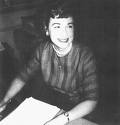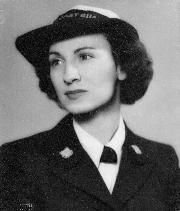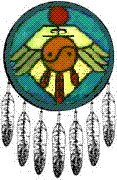

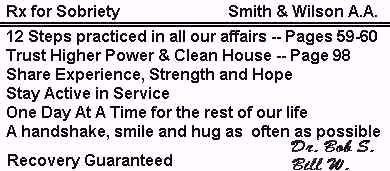 Click The Images To Go To Page Indicated In The Flag
May 27, 1917 - February 14, 2007 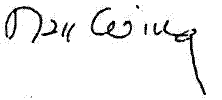
THE TEXT OF THE OBITUARY:
Nellie Elizabeth Wing Nellie Elizabeth Wing, age 89, died Wednesday, February 14, 2007 at Sunrise Assisted Living, Wayne. Ms. Wing was born May 27, 1917 in Kendall, NY the daughter of the late William Frank and the late Daisy (Shepard) Wing. She lived in Wayne and was formerly of New York, NY. Ms. Wing was a 1940 graduate of Keuka College in NY.
Nell Wing started work at the Alcoholic Foundation, 415 Lexington Ave, NYC. Starting as a typist earning $32 a week ($300+ in 2007 dollars), she stayed for 36 years. (Grateful to Have Been There by Nell Wing page 15, Getting Better Inside Alcoholics Anonymous by Nan Robertson page 67) She was the Administrative assistant and secretary to Bill Wilson, the founder of A.A., in New York City from 1947 until 1982. Nell was also the 1st archivist for A.A. GSO from after Bill's death until she retired. .After that, she traveled the world, often speaking at A.A. functions. She worked with Lois at Stepping Stones until Lois passed in 1988, an association that lasted 42 years. Ms. Wing attended the Lakeland Unitarian Universalist Fellowship, in Wayne. She was a Watercolor Artist and a Sculptor as well as the Author of the book "GRATEFUL TO HAVE BEEN THERE." She is survived by Nephews; William L. Wing of West Milford, David Wing of PA, Michael Bowler of Las Vegas, NV and a Niece, Maria Oplatka of CA. She was predeceased by her Brothers, William F. and Roswell B. Wing and her Sister, Mary Bowler. Visiting hours will be Saturday, Feb. 24, 2007 from 1-5PM at Moore's Home for Funerals, 1591 Alps Road, Wayne, NJ. A service of will be held at 4:00 pm and will be celebrated by the family. Private cremation and burial to follow. Memorials may be made to the Alzheimer's Association, 400 Morris Ave, Suite 251, Denville, NJ 07853 Here is an interview with Nell Wing, Bill’s secretary after Ruth Hock retired. Published in the Grapevine© in 1994 June 1994 Nine years after the Fellowship of Alcoholics Anonymous began in Akron, Ohio, the Grapevine magazine published its first issue in June 1944. Three years after that, Nell Wing arrived in New York. A young woman in her late twenties, Nell had decided to go to Mexico to pursue a career in sculpture. In the meantime, she wanted a temporary job to earn a little more money for the journey. The agency where she applied for a temporary job told her about an opening at the headquarters office of Alcoholics Anonymous. Nell knew about AA, having read Morris Markey's article "Alcoholics and God" in the September 1939 Liberty magazine, and through other magazine articles in the early forties, as well. In 1947, she started working in the office of the Alcoholic Foundation (now the General Service Office), and in 1950 became Bill W.'s secretary. Within a few years, she became close friends with Bill and his wife, Lois, and on weekends she regularly went up to Stepping Stones, their home in Bedford Hills, New York, to help Bill with correspondence or research, or just to keep him and Lois company. After Bill died in 1971, Nell continued her close association with the General Service Office and with Lois. She organized the AA Archives, and in 1993 published a memoir called Grateful to Have Been There. Nell never got to Mexico, but she worked for AA for thirty-six years. She still travels frequently around the country, speaking to groups about AA history. Two Grapevine staff members interviewed Nell Wing at the Grapevine office in New York. Grapevine: You've described the Grapevine as having an "improbable history." What did you mean? Nell Wing: It's miraculous that the Grapevine is still in existence fifty years later. The Grapevine doesn't have what a lot of magazines have, like ads or a sales force. It has to stick to its primary purpose and basically that's to ask members to write articles and to share their stories. But the Grapevine has kept going because there are many, many people who understand and appreciate it. There are always enough members who find it useful and helpful in maintaining sobriety and keep it going. Some even read it long before becoming members of AA. Grapevine: What was it about the Grapevine that Bill W. found so appealing? Nell Wing: He quickly saw it as a means of carrying the message. And since he couldn't connect personally with all groups and areas in AA on a regular basis, he used it as a primary source of sharing and explaining the important issues that he wanted accepted by the Fellowship. It took several years, as we know, before there was a steady and enthusiastic growth of Grapevine readers. But Bill thought that sharing his ideas in print this way was important. It was there - you could read it, you could think about it, you could refer to it later. Grapevine: That was one of the reasons for writing the Big Book - so the program wouldn't get "garbled" in transmission Nell Wing: Exactly. If it's in print, it's a matter of record. And the fact is, Bill was perhaps his own worst enemy in trying to get his ideas across. He could pound you into a corner, so to speak, because of his frustration when his ideas were not understood and accepted by the trustees and the membership at large. So the Grapevine was an effective way for him to reach people - without the pounding! Grapevine: The Grapevine is now fifty years old, and we're considering what our role for the future will be. Do you have any thoughts about where the Grapevine fits in? Nell Wing: Preserving the experience - to my mind that's what you do in the Grapevine. The Grapevine's purpose is similar to the purpose of archives in general: to preserve the past, understand the present, and discuss the future. So many young people are coming in today and they need to know about the history of AA. Grapevine: What was your first acquaintance with alcoholics or AA? Nell Wing: My dad was a teacher and a justice of the peace in our small town. I knew about alcoholics very early on because the state police would often drag guys over at three in the morning, rapping on our door. And many of these drunks were professional people in our town or nearby towns, and perhaps good friends of my dad's. Occasionally he'd pay their fines for them - when you've been out drinking until three A.M., who has any money left to pay fines with? I read about AA in the September Liberty magazine - sitting in my college dorm - in 1939. So when I first came to work at AA, I knew about it, and I also knew that a drunk was not always a Bowery bum. Grapevine: You worked with Bill W. for twenty years. Tell us more about him. Nell Wing: As I said, he could be adamant about what he knew had to be accomplished. He had the vision to see what was needed in order to preserve the Fellowship. But everybody liked to argue with Bill, and he liked to argue, too! Listening to Bill was some experience. When Bill would be talking, say at a banquet, many in the audience would be very moved and even weeping at what and how he shared. He could touch you in ways that were really remarkable. Generally, he could learn from experience. Like for example when he was advised to set the tone and tense for the text of the Big Book: don't say, you must do it this way. Just say, look, this is what we do. He was a teacher but not a preacher! Grapevine: What's amazing is that he listened. Nell Wing: I always think how Bill was so much like the philosopher and writer William James. Both Bill and James were spiritual, though not necessarily deeply religious; they were also both pragmatic New Englanders. Bill had a way of talking about a deep faith inside himself the way James did. Bill liked to read about different interpretations of what God was like. He was very philosophical, and James's "The Varieties of Religious Experience" was very meaningful to him, as it was to many AAs both in those early years and since. Grapevine: How were Bill and Dr. Bob different from each other? Was Bill the greater risk-taker? Nell Wing: I think so. Dr. Bob, as a doctor, believed in being cautious and advising people how to evaluate ideas and solutions, to weigh them carefully - have everyone in agreement before taking action. Bill believed in putting the goal forward and aiming for it. No matter who liked it or who didn't like it: aim for that goal. Bill always thought way ahead. Dr. Bob was the monitor, evaluator, the ground level, the supporter of Bill's ideas, even perhaps not always agreeing with the timing of an idea. Another miracle! A perfect match! A wonderful partnership, indeed. Yes, Dr. Bob was the right person to balance Bill. His view was, Keep it simple. Bill had vision; that was one of his gifts - he could see the road ahead. Grapevine: Where do you think he got this? Nell Wing: I don't know. He simply was of that character. He had a need to think ahead to the next step, a sense of direction, an ability to judge what the needs were, and a great ability to bring different streams of thought together. But he took time to think things through. People said that up at Stepping Stones, Lois was the one who did the yard work, the plumbing, and the daily things that husbands usually do. It was true. Bill would be walking a lot, contemplating, just thinking ahead. Grapevine: Did Bill have a sense of humor? Nell Wing: Yes, he'd knock us off our chairs sometimes. He'd tell Lois and me something funny that happened to somebody he'd heard about, and the way he told it, we would just absolutely go into hysterics. He could tell a naughty story, too. It wasn't that he was always pristine about everything. In the office, Bill and I used to share a big room; I was at one end and he was at the other end. So I saw the "passing parade," as it were - people coming in to see him. Occasionally somebody would say, "Hey, Bill, I just heard this," and then tell a joke currently making the rounds. And Bill would look at him as if the guy was crazy. If he didn't relate to a story or it didn't have a spark, he'd just kind of look at you. The poor guy would be standing there, so disappointed that he was telling Bill a joke and Bill wasn't laughing. Grapevine: Lois and Bill never had children. Do you think they wanted them? Nell Wing: Lois did, certainly. She always wanted children but she had three ectopic pregnancies back in the twenties. She and Bill tried to adopt but the adoption facility said they needed a friend who could recommend them, and the friend they asked - an old friend of Lois's - said that quite frankly she didn't think it was the right thing to do, because of Bill's drinking. So they never got the go-ahead to adopt. But Lois loved children. Up at Stepping Stones, young kids would come running over to visit with her. She didn't treat them like silly children but would talk to them as if they were adults. And even years later, the grown-up children would come back and see her. At Halloween time especially there were always lots of neighborhood kids - I never think of Halloween without remembering Bill and Lois. Lois always had the table full of pumpkins and treats. When the children knocked at the door she'd be there to give them a little something. Then the kids would pull straws to see who got the biggest pumpkin. Grapevine:: You mentioned before about Bill reading. Did he like to read? Nell Wing: He read a lot in earlier years. One of Bill's great attributes was that he could listen and learn. And a lot of very well-informed people came to visit Stepping Stones over the years. A lot of ideas were expressed there and talked about. Grapevine: Did Bill imagine that AA was going to be as big as it is today? Nell Wing: I remember in the late 1940s I said, "Bill, this Fellowship is going to go all over the world." He laughed and said, "Nell, you can say that - I can't." But the growth was phenomenal. After the war, many servicemen in AA were stationed overseas and were responsible for getting AA started in Japan in the late forties and in Frankfurt, Germany. Actually, in Japan, the program started out with thirteen steps, not Twelve. And do you know what the wives were called in Japan? The Chrysanthemums. Wives were invited to open meetings - well, not invited, but tolerated, and they definitely did participate! Grapevine: Any thought on what made AA so successful? Nell Wing: You know, one reason is that Bill wanted to avoid the mistakes of the past. He paid great attention to what made the Washingtonians and other similar movements fail back in the nineteenth century. Grapevine: That's true, especially in a Grapevine article in 1948 - "Modesty One Plank for Good Public Relations." [In this article, Bill discusses how the Washingtonians veered from their initial singleness of purpose - which was helping alcoholics - and how they didn't have a national public relations policy - a Tradition, as AA does.] Nell Wing: Yes that was a marvelous article. But there were also plenty of things going on in the present that helped shape AA policy and Traditions, too. Grapevine: Such as? Nell Wing: Well, for one thing, when Marty M. was soliciting for the new National Committee for Education on Alcoholism (later the National Council on Alcoholism), she made a big error in 1946. She said that whoever contributed to the NCEA would also be contributing to AA, or that AA would benefit from it. Well that created some explosion! Bill was traveling and speaking out West and AA’s were bombarding him with questions: "What's going on? What is this woman saying?" The trustees of the Alcoholic Foundation had their first press conference because of this, explaining that what Marty said was not endorsed by AA, and that the trustees had nothing to do with the solicitation announcement. Bill and Dr. Bob had earlier let their names be put on the NCEA letterhead because Bill was very supportive of what Marty was doing in the field of alcoholism. Bill never believed that AA had all the answers for every alcoholic. He always said that whatever worked for the individual was what was needed. Anyway, the Marty M. controversy lasted four years - it was a fast and furious business at the time. But it helped galvanize acceptance of the short form of the Traditions, which were later accepted in 1950 at the Cleveland Conference. Grapevine: While Bill was clearly one of the Fellowship's old-timers, it seems he was often at loggerheads with other members about a variety of things. Nell Wing: Well, when he wrote the Twelve Concepts in 1959, most of the Fellowship wasn't interested at all. And in the early fifties he proposed a change in the ratio of alcoholics to non-alcoholics on the Board of Trustees. And nobody wanted to hear about that proposal, either. Nevertheless, both the Concepts and the ratio proposal were eventually accepted by both the Board of Trustees and the Fellowship as a whole. Grapevine: These are more examples of how Bill looked ahead. Nell Wing: Absolutely. That's why he was so concerned about establishing the General Service Conference in 1951. By the late 1940s, it was no secret that Dr. Bob probably didn't have long to live. [Dr. Bob died in 1950.] And Bill was wondering how much time he himself might have. He wanted and expected the Fellowship to be able to go on without him and Dr. Bob. But nobody wanted to face the fact that he was going to die some day. Grapevine: Weren't there a number of projects Bill wanted to get to in the years following Dr. Bob's death? Nell Wing: In 1954, Bill had the idea of creating a writing and research team to help him with, among other things, a major history of AA. Bill's depression was still with him and he knew that if he could give a lot of time to doing something specific and keep at it, that would help the depression. He wanted to do a good, thorough history and also put together a new edition of the Big Book. The scope of the history project proved to be too much, though, and had to be scaled back. Nevertheless, the result was AA Comes of Age. The new edition of the Big Book finally did get completed, and Bill was also eager to do a summing up of what he had learned, the wisdom that had come up through the Fellowship. He had a very precise idea of the kind of book he wanted to write, but he wasn't able to do it. In the end, what took its place was As Bill Sees It - not a bad substitute! Grapevine: What were Bill's depressions like? Nell Wing: Most times you didn't know he was going through it. His depressions came and went. Sometimes, not often, but occasionally, when he was dictating to me in the office, he would just put his head in his hands and weep for a bit. The worst of these depressive bouts were between 1945 and 1955. What he accomplished, AA-wise, despite his depressions, is a miracle. So many people wanted Bill's advice - not just AA and Al-Anon friends, but nearby neighbors at Bedford Hills. They'd ask if they could come over to Stepping Stones, and Bill always said yes to everyone. To get away from the phone ringing and all the people, Bill and Lois would often go away in the middle of the week - to their "hideaway," they called it, a small rented cottage ten or fifteen miles away. Lois would write and work on Al-Anon matters and Bill would catch up on correspondence and memos regarding current AA projects. Then, once a year they often took an overseas trip, usually in the fall, and in the spring they would take a trip around the United States and Canada, visiting AA friends and discussing AA matters. Harriet, the housekeeper, would pick up their mail, and I'd go through it to see what needed to be answered right away and what could wait for their return. Grapevine: Bill seems to have taken every opportunity possible to communicate - through memos, letters, Grapevine articles, the Big Book, the "Twelve and Twelve," traveling around, talking to groups. Nell Wing: Yes, he was a terrific communicator! And he felt intensely the need to share his plans for AA's future and to receive endorsement of them - despite the often feisty opposition from some. Right here, I would like to mention the Grapevine book, The Language of the Heart, for I think it's a most valuable book. If you want to know what Bill W. was all about, read that book! Grapevine: Tell us about working in the Archives of the General Service Office. Nell Wing: I wanted the Archives started, as did Bill. My father, who valued history, had a huge library at home, and after college I took a course in library science and liked it. I always thought that it was very important to preserve AA history, preserve how it started and how it grew - to remember the mistakes in order to avoid future ones. It certainly was important to Bill, but it was hard to get others to understand the need for setting up an Archives. In Europe, in the fifties, archives were thought to be very important, but were not generally so considered here in the United States. We're a "now" people; we don't always think about the future in terms of preserving the past. In 1954, a fellow named Ed B. was hired to help Bill with his writing projects. Ed was a wonderful guy - a writer, a criminologist, and just newly sober - but he didn't think it was important to preserve all the material we had collected and researched. Our desks were opposite each other and I'd watch him going through pamphlets and letters, throwing many of them in the wastebasket. I'd say, "Hey, Ed, we can't throw all this away." I knew from experience that each of Bill's letters contained at least five different ideas! Ed had had a laryngectomy - so he'd write out a note, "No, that's not important any more." I didn't argue, but after he left work at four o'clock, I'd take everything out of the wastebasket and put it all safely away in storage boxes until I could sort it out. I'm especially grateful that Bill so strongly believed in preserving AA's experience. He knew the importance of getting things done, and had a special gift for timing. I often think, suppose he hadn't possessed certain leadership abilities - where would AA be now? Maybe some little sect, who knows? I think it was destined. I think the Higher Power set this up, I really do. The fantastic success of AA is like a big puzzle and there are pieces that you know fit in, but you just don't know where until you look back into the past. Grapevine: How has being so close to the Fellowship affected you? Nell Wing: Well, I always like to say I'm on the outside looking in. About a week after I first came to the office, I attended an open AA meeting at a meeting hall on Forty-First Street. I remember a gentleman sharing his story and I found myself weeping - while everyone else was laughing! Right from the start, I was spellbound by AA. One person helping another who had a similar problem - that is still a stunning idea to me. Over the years, I've gained some spiritual gifts myself. Most non-alcoholics who are familiar with AA feel the same sense of growth. Grapevine: Hanging around with a bunch of drunks for this long - it can only go up from here! Nell Wing: I'll tell you something, I don't know people who have lived and learned and reacted to life like AA members. I've been taught - and I'm grateful. Every morning when I wake up, I express gratitude for what's happened to me. © Grapevine, AA Grapevine Inc., 1994 A short history of the GSO archives. The collecting of AA archives was started by our co-founder Bill W. less than twenty years after the founding of our Fellowship. Bill had the foresight and the vision to see we needed to preserve an historical record of our movement’s origins so that "myth does not predominate over fact." It is possible to trace this back to June 1949 and chart correspondence between Bill and Jack Alexander, the author of the famous 1941 Saturday Evening Post article. Bill wanted Jack Alexander to do a follow-up article in order for him to record the rapid changes then happening in the Fellowship. Jack was unwilling to do this so soon; only nine years since his last look at AA. Jack thought not much had changed to justify another look: that the psychology of drinkers was the same, and AA’s method of dealing with alcoholics was also unchanged. Bill disagreed and told him that with the introduction of the 12 Traditions, Alcoholics Anonymous was like no other society on earth; that there was much new material for him to consider, albeit most of it was still in Bill’s head, but that there was enough new material there to form the basis for a new article. But even before this time Bill was aware of the need to record events as he encouraged Lois to keep a journal and a copy of all their correspondence. However, it was from 1950 that Bill and Nell Wing (his secretary) really concerned themselves with obtaining and preserving historical records. While from 1950 to 1954 Bill was writing the 12&12 he was also collecting oral histories from old-timers in Akron and Cleveland. Bill would travel out West specifically to record these people something which shows how much importance he gave to archival work. He also set about recording the recollections of the Trustees, the members of staff at the office like Ruth Hock and the non-alcoholic clergymen who had played such a vital part in establishing AA. As an example on the 23rd of February 1955, Bill wrote to Clarence S. in Cleveland asking him to record his recollections, and this gives an accurate insight into the methods and purpose of archives. "I would like to have you make a tape recording about your recollections of the old days. There isn’t any rush about this as the preparation of a history will have to be done carefully and gradually over the next 2 or 3 years. I have though made a couple of trips to Akron and Cleveland and have already interviewed quite a lot of the old folks, so as to be sure and get the record straight. You can get a good running start at the history by retelling your own personal story how AA came to your attention; what your first impressions were and how it developed in the first few years in Cleveland. I hope you can dwell at length on the difficulties as well as the humour of those years, relating as many anecdotes as possible. You can say anything you like being assured that nothing will be published without your consent. The preliminary investigation shows that it isn’t hard to prepare a fact, what happened, that is dates when people came in, groups started and so forth. The hard thing is to lay hold of the atmosphere of the whole proceedings and the anecdotal material that will make the early experience live. When I first set out to gather material I ran into a little resistance. I pointed out to them that if the old-timers in Akron and Cleveland wouldn’t go on record as to what happened, how in God’s name could I or anyone else tell an accurate story for the future. Clarence, I feel that you should be one of those very best sources. So think it over. Make an outline of topics that you want to talk about and go to it at any length at all -- recording tapes are cheap. So ransack your memory if you will." In 1955 Bill appointed Nell Wing as Archivist and as the oral histories began to pour into the office between 1955 and 1960 Nell found herself with just one of many ongoing projects she had to do. Nell had been salvaging discarded correspondence and other valuable material written by Bill and storing it in boxes. With what she gathered in this way and by other more conventional methods, Nell went on to create the AA Archives. In 1965 she did manage to make a small beginning on classification but it was not until after Bill’s death in 1971 that Nell really got down to serious archival activity. In particular, she received encouragement from a member down in Florida, Tom S., who kept encouraging her to keep going when others thought she was creating a monster. It seemed now the time for archives had finally come and an Archive Committee was formed in 1973. In 1975 an archive office at GSO was officially opened by Lois and it is worth remembering that even archivists are not perfect as nobody that day thought to record Lois’s words. When I visited GSO archives in 1980 Nell and Bobbie B. escorted me all day long, making sure I had anything I was curious about or wanted to look at. Nell was beaming with gratitude and a very gracious lady. It was she who placed in my hands the very first Big Book ever sold, for me to look thru ... It was a well used but well cared for book, containing thousands of signatures ... Virginia MacLeod bought it in 1939 at the meeting at Bill's home on Clinton Street the night the book came out. She returned the book to the GSO archives in 1977. I held it again in 2002 when I again visited the archives. It was the inspiration for my replica first edition Big Book which I used to collect signatures for 20 years from around the world ... Thousands of them from most of the nations where A.A exists. Unfortunately it was lost when my boat sank in the Mediterranean the end of November, 2005. If you would like to see some of the signatures in that first sold book and some real AA history click this link, First Sold Big Book Signatures. It is a 3,75meg file and will take a minute or two to download. At the 1990 International Convention in Seattle, Nell was presented with the 10 millionth copy of the Big Book of Alcoholics Anonymous.
 Love and Peace, Barefoot Index of AA History Pages on Barefoot's Domain As in so many things, especially with we alcoholics, our History is our Greatest Asset!.. We each arrived at the doors of AA with an intensive and lengthy "History of Things That Do Not Work" .. Today, In AA and In Recovery, Our History has added an intensive and lengthy "History of Things That DO Work!!" and We will not regret the past nor wish to shut the door on it!!
KEEP COMING BACK!
On the Web Feb 17, 2002 in the Spirit of Cooperation Three mighty important things, Pardn'r, LOVE And PEACE and SOBRIETY |
